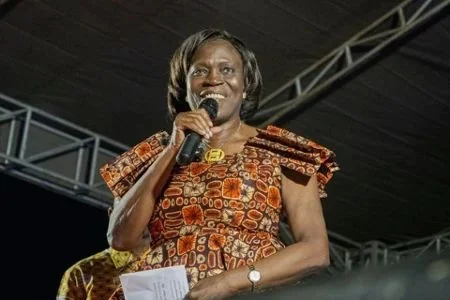Former Ivory Coast first lady Simone Gbagbo has officially declared her candidacy for the 2025 presidential election, vowing to lead the country toward unity and reform.
Now 76, Gbagbo long known as the “Iron Lady” of Ivorian politics — will challenge President Alassane Ouattara, who seeks a controversial fourth term. Running under her own party banner, she says her mission is to rebuild the nation’s political foundations without her former husband, Laurent Gbagbo, beside her.
Her campaign emphasizes social justice, national reconciliation, and economic freedom, positioning her as a voice of renewal in a race dominated by familiar faces.
From Prisoner to Presidential Contender
Simone Gbagbo’s political path has been anything but ordinary. As first lady during one of Ivory Coast’s most turbulent eras, she witnessed and was deeply involved in the civil war between 2002 and 2007 and the post-election crisis of 2010, which claimed roughly 3,000 lives.
After her husband refused to step down following electoral defeat, both were arrested in 2011. Simone was sentenced to 20 years in prison for crimes against the state but received amnesty from President Ouattara in 2018, a gesture aimed at calming national unrest.
Following her divorce in 2021, she founded the Movement of Skilled Generations (MGC), signaling a political comeback on her own terms. Known for her steely demeanor, she once boasted, “I stand above ministers,” a statement reflecting her enduring confidence and influence.
Healing a Divided Nation
At the heart of Gbagbo’s campaign is a call for national reconciliation. She promises a sweeping amnesty law to release political prisoners and allow exiled citizens to return.
Economically, she has pledged to push for monetary independence by replacing the CFA franc, a euro-linked regional currency, with a new West African currency that supports local growth.
Her alignment with the Alliance of Sahel States — Burkina Faso, Mali, and Niger signals solidarity with governments challenging Western dominance in regional policy. This stance contrasts sharply with Ouattara’s traditional diplomacy and appeals to Ivorians yearning for self-determination.
Political Legacy and Determined Comeback
Gbagbo’s activism began in the 1970s when she opposed the one-party rule of Felix Houphouët-Boigny. Together with Laurent, she co-founded the Ivorian Popular Front (FPI) in the 1980s and later secured a seat in parliament in 1995.
Her defiance during the 2011 crisis, followed by years behind bars, turned her into a symbol of endurance. Though her critics recall her role in past turmoil, many supporters see a woman transformed by experience and ready to lead with empathy and strength.
Political analyst Arthur Banga views her candidacy as a calculated step. “She’s not in this to win immediately,” he said. “She’s building a foundation for 2030, when Ouattara will likely bow out.”
Support Builds as Momentum Grows
Gbagbo’s campaign gained fresh energy after Charles Blé Goudé, once a close ally of Laurent Gbagbo and acquitted by the ICC in 2019, endorsed her candidacy. His backing bolstered her image as a credible opposition figure.
In May 2025, her rally in Abidjan drew massive crowds and ignited online enthusiasm under the hashtag #Simone2025. The event underscored her appeal among young voters and those seeking a break from decades of political rivalry.
Her message of inclusion and stability resonates in a country still healing from ethnic and regional divides. Through a mix of emotional storytelling and pragmatic plans, Gbagbo is positioning herself as both visionary and realist.
Preparing for the Long Game
While President Ouattara remains the frontrunner, Simone Gbagbo’s campaign marks the beginning of a broader political movement. Her proposals — from reconciliation to economic reform — aim to redefine Ivory Coast’s political discourse.
Even if victory eludes her this year, analysts believe she is laying the groundwork for future influence. For Gbagbo, the 2025 race is less about winning now and more about reshaping the nation’s direction for the next generation.
As Ivory Coast faces mounting economic and social challenges, her message of peace and independence may yet prove to be the spark for a new era of leadership.
________________________________________________
Cameroon’s Youth Frustration Grows as Biya Seeks Eighth Term






